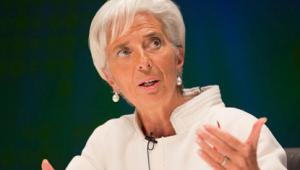The latest Economic Outlook report, published today, argued that the world economy has strengthened from previous years and will see slight improvements in growth rates in 2018.
But OECD secretary-general Angel Gurria warned while “growth has picked up momentum and the short-term outlook is positive" that “there are still clear weaknesses and vulnerabilities”.
He added: “There is a need to focus structural and fiscal action on boosting long-term potential as monetary policy support is reduced.
“Countries should implement reform packages that catalyse the private sector to promote productivity, higher wages and more inclusive growth.”
The US economy is projected to fall back by 2019, despite President Donald Trump’s claims about the impact of his recent tax reforms.
“These numbers will grow by leaps and bounds,” Trump tweeted of the economy last month, but the OECD analysis actually shows US growth hitting 2.5% by 2018 but then dropping again to 2.1% the year after that.
...if Congress gives us the massive tax cuts (and reform) I am asking for, those numbers will grow by leaps and bounds. #MAGA
— Donald J. Trump (@realDonaldTrump) October 11, 2017
Earlier this month, a survey found that Trump was harming the global economy, according to economic experts around the world.
Germany is forecast to grow by 2.5% in 2017, 2.4% in 2018 and a 2.1% in 2019, while Japan is projected to grow at a rate slightly below earlier forecasts at 1.5% for 2017, 1% in 2018 as “fiscal consolidation resumes”.
China and India are projected to see the biggest growths at 6.8% and 6.7% in 2017.
India’s growth would pick up to a 7.4% rate in 2019 thanks to the reforms that are expected to boost investment, productivity and growth.
The report also said the UK economy will continue to slow until at least 2019.
Growth in the UK economy will remain “sluggish”, projected at 1.5% this year, falling back to 1.2% in 2018 and again in 2019 to 1.1%.
Economic growth in the EU area as a whole is also set to outperform the UK.
Brexit is identified as one explanation for the poor performance, with slow growth partly a result of “continuing uncertainty over the outcome of negotiations around the decision to leave the European Union”, the OECD said, as well as falling purchasing power caused by inflation.
Gurria added that slow wage growth around the world continued to frustrate and surprise the OECD.
“Inadequate real wage growth is in part – though only in part – linked to slow average productivity growth, which remains another central concern,” he said.
“The weakness of productivity growth is particularly puzzling given the ongoing digital revolution, which should be unlocking efficiencies and allowing each worker to produce more.”













